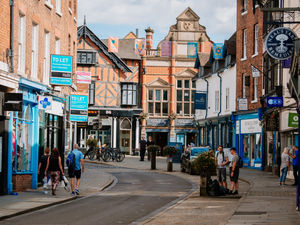Council set to order purchase of Shrewsbury takeaways as 'vital' part of Flaxmill regeneration
A compulsory purchase order is set to be made on two Shrewsbury takeaways to enable the final phases of a multi-million pound redevelopment project centred on one of the county’s most historic buildings.

The Flaxmill Maltings in Ditherington has undergone a major programme of refurbishment over the last five years to create office space and a visitor centre, and Historic England, which owns the site, has now said the completion of the scheme is dependant on it being able to redevelop the land to the front along Spring Gardens.
This includes numbers one and 15 Haughmond Square, currently occupied by the Chilli Spice and Spring Garden takeaways – but attempts to negotiate with the current owners of the buildings have so far proven unsuccessful.
Shropshire Council is now being asked to invoke its compulsory purchase order (CPO) powers to acquire the sites if no deal can be reached, and cabinet members have been advised to approve the order at a meeting next week.
It comes after a similar report recommending a CPO be made on the buildings was due to be presented to cabinet in December 2020, but members were told at the meeting that Historic England had asked for it to be withdrawn.
However the new report, by the council’s director of place Mark Barrow, reveals the acquisition of the sites has still not been agreed.
Work is due to be completed on the Main Mill – famed for being the world’s first iron-framed building – at the end of May, and Mr Barrow’s report says the later phases of the project will be compromised if the takeaways cannot be developed.
It says: “The scheme is vital to ensuring the overall success of the Flaxmill site’s regeneration.
“In particular, it will facilitate the fourth stage and final phase of the Flaxmill redevelopment, which will see reinvestment of a pre-agreed proportion of the profit generated by the delivery of the scheme into the ongoing maintenance, repair and preservation of the complex of historic buildings comprised within the Flaxmill.
“In order to realise the plethora of public benefits which the Flaxmill Maltings project has the potential to deliver, it is essential that this final stage of development is reached, implemented and completed.
“Moreover, it will secure the site’s long-term and sustainable future in order that its legacy may be safeguarded and continue for the benefit of all, including the local and wider communities and visitors to the town of Shrewsbury.
“The scheme is therefore vital to ensuring the overall success of the Flaxmill’s regeneration, and without which fourth stage, and the full delivery of the Flaxmill project and associated public benefits, is in jeopardy.”
Planning permission to return the two take away buildings to residential use was granted last year, along with the construction of 120 new homes and two commercial buildings.

Built in the 19th century, numbers one and 15 once framed the entrance to Haughmond Square, which contained small workers’ cottages that have long since been demolished. The approved plans will see this historic gateway into the Flaxmill site reinstated.
The report says negotiations with the owner of 1 Haughmond Square, which houses Spring Garden take away and a residential flat, are at an “advanced stage” and options for re-housing the tenant are being explored.
However Mr Barrow says “very little if no progress” has been made regarding number 15, which houses Chilli Spice and the flat above.
“The council will continue to negotiate with affected parties, both by way of direct communication where this is sought, and via the ongoing consultation and attempts at engagement being conducted by Historic England, with a view to acquiring their interests by agreement,” the report adds.
“However, it is clear that use of the council’s powers of compulsory acquisition is needed to ensure that the scheme can be delivered in full and within a reasonable timeframe.”
If cabinet agrees to the CPO, it will need to be confirmed by the Secretary of State for Levelling Up, Housing and Communities before it can take effect.
The council will then transfer the land into the ownership of Historic England, which has agreed to meet all costs.
The report adds: “In the absence of the CPO, there is no certainty as regards assembly of the land required to implement the scheme, thereby jeopardising the delivery of the Flaxmill’s redevelopment in full and its associated public benefits.
“Accordingly, the officer’s consider there is a compelling case in the public interest for the compulsory acquisition of the order land.”
It is the second time Historic England has asked the council to use its CPO powers to progress the Flaxmill scheme.
In September 2019 cabinet agreed what was thought to be the council’s first ever CPO to acquire a piece of land to facilitate the creation of an access to a new car park on the site when the landowner could not be traced.




